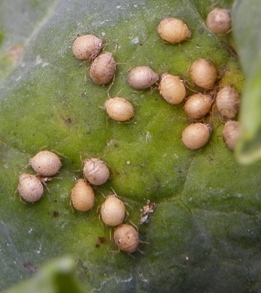 |
| Aphid Mummies |
As you are harvesting your crop keep a look out for these pests, but also pay close attention to their appearance - some may actually be aphid mummies. These are the bodies of aphids that have been parasitized by a species of very small wasp that does not sting people. Normal aphids will be green and living; aphid mummies are tan, appear puffed up, and are hollow.
Aphid mummies are a good sign that mother nature is helping defend your garden! Learn more about aphids and how to control them in vegetable crops from this article posted on the Pender Cooperative Extension website: http://pender.ces.ncsu.edu/2012/10/how-to-control-aphids-on-vegetable-crops/



